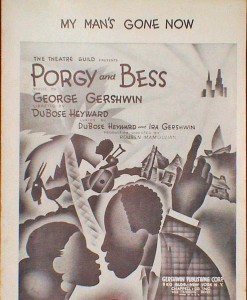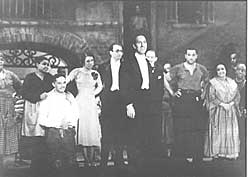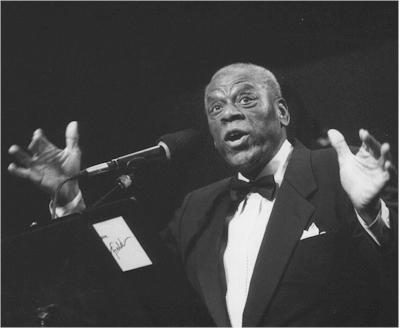Riverwalk Jazz presents the first in a two-part broadcast series devoted to The Jim Cullum Jazz Band’s acclaimed jazz transcription of George Gershwin’s American folk opera Porgy and Bess. The award-winning bass baritone William Warfield, famous for his memorable stage role as Porgy, appears as narrator in this performance recorded live at The Landing in San Antonio.
LISTEN — Piano Legend Dick Hyman on Porgy and Bess
DuBose Heyward, a native of Charleston, South Carolina, wrote the novel Porgy in the early 1920s, painting a story of love and honor based on characters from the Charleston waterfront scene. George Gershwin read Porgy in 1926, fell in love with the story, and immediately wrote to Heyward inviting him to collaborate on an opera based on the novel.
Gershwin received a commission from the Metropolitan Opera to write a grand opera in 1930 and was free to select the libretto. Although Gershwin was impressed with the Met's offer, he knew the venue would present formidable problems to mounting an opera based on Porgy the way Gershwin imagined it. At the time the Met's doors were closed to African American performers and Gershwin was firm on using a black cast.

Sheet music cover for "My Man's Gone Now," 1935
Gershwin spent a few years searching for another story. Nothing appealed to his interest like Porgy and he refused to present the story he had fallen in with in blackface. Meanwhile, still basking in the success of their landmark musical Show Boat, Jerome Kern and Oscar Hammerstein made an attractive offer to Heyward for the musical rights to Porgy. The popular entertainer Al Jolson was to play Porgy and the producers planned to turn the book into a musical comedy with a cast in blackface. Pressure from the competition forced George Gershwin and DuBose Heyward to move ahead and announce their intention to compose a folk opera based on Heyward's novel—and the groundbreaking news that Porgy would be performed on Broadway with an African American cast.
Late in 1933 Gershwin began to work on Porgy and Bess. He visited Carolina churches, nightclubs and prayer meetings, immersing himself in the culture. Meanwhile, Heyward and Ira Gershwin wrote the lyrics. Gershwin’s score brilliantly combines popular and classical forms, bringing together elements of opera, jazz and folk music.
Gershwin was quoted in the New York Times in 1935:
"Because Porgy and Bess deals with Negro life in America it brings to the operatic form elements that have never before appeared in opera, and I have adapted my method to utilize the drama, the humor, the superstition, the religious fervor, the dancing and the irrepressible high spirits of the race. If doing this, I have created a new form, which combines opera with theater, this new form has come quite naturally out of the material."

1935 Curtain Call at the Alvin Theater. Photo wosu.org
To Gershwin’s great disappointment, Porgy and Bess opened at New York's Alvin Theatre on October 10, 1935 to mixed reviews and closed in less than six months. Gershwin died in 1937 at the age of 38, before Porgy and Bess became recognized as one of the great artistic accomplishments of American culture in the 20th century.
The Jim Cullum Jazz Band began to create an original jazz transcription of Porgy and Bess in late 1984 with arrangements by the band’s pianist, John Sheridan. The work premiered with highly favorable reviews at the McNay Art Museum in San Antonio in October, 1985, and was released on compact disc by CBS Masterworks in 1987. Until his death in 2002, Mr. Warfield joined The Jim Cullum Jazz Band in numerous live performances of their jazz transcription of Porgy and Bess in venues across the United States.
Jim Cullum dedicates the radio production of Porgy and Bess to the memory of Margaret Batts Tobin and Robert Tobin of San Antonio's Tobin Foundation.
Photo credit for home page teaser image:
George and Ira Gerswhin with author DuBose Heyward 1934;
courtesy The Ohio State University Libraries
Text based on Riverwalk Jazz script by Margaret Moos Pick and Jim Cullum ©2012


